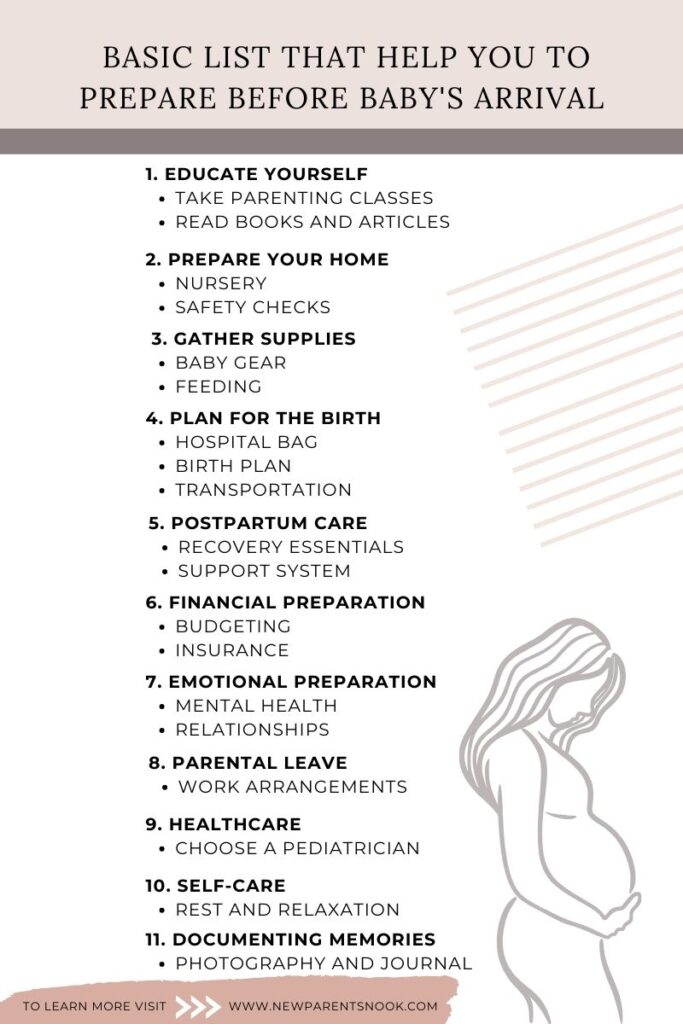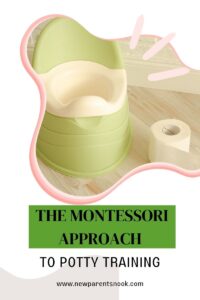Some links on our blog are affiliate links, meaning at no extra cost to you, we may earn a commission if you purchase through them. We participate in the Amazon Affiliate Program, and we recommend products we believe in. Your support helps us keep providing valuable content. Thank you!
Here’s a detailed guide to help you navigate through the journey of pregnancy, childbirth, and the early days of parenting:
1. Educate Yourself
- Parenting Classes: Enroll in comprehensive classes that cover topics like childbirth techniques, breastfeeding tips, and infant CPR. These classes not only prepare you for the physical aspects of childbirth but also empower you with knowledge to care for your newborn.
- Read Books and Articles: Dedicate time to reading up-to-date books and reputable articles about pregnancy, labor, and infant care. This will help you understand the changes your body is going through, what to expect during labor, and how to care for your baby once they arrive.
2. Prepare Your Home
- Nursery Setup: Create a safe and comforting space for your baby by setting up a nursery. This includes assembling a sturdy crib or bassinet, a changing table with storage for diapers and wipes, and organizing clothes and other baby essentials.
- Safety Checks: Conduct a thorough walk-through of your home to identify and mitigate potential hazards. This includes securing furniture to the wall, covering electrical outlets, and ensuring there are no small objects that a baby could choke on.
3. Gather Supplies
- Baby Gear: Invest in quality baby gear essentials such as a reliable car seat for safe travel, a comfortable stroller for outings, a baby carrier for hands-free mobility, and an ample supply of diapers, wipes, and newborn clothing.
- Feeding Supplies: Depending on your feeding plan, gather the necessary items. For breastfeeding, consider a breast pump, nursing bras, and breast pads. If formula feeding, stock up on formula, bottles, and nipples to ensure you’re well-prepared.
4. Plan For The Birth
- Hospital Bag: Pack a bag with essentials like clothing for you and the baby, toiletries, snacks, and any personal items that will make your hospital stay more comfortable.
- Birth Plan: Draft a birth plan outlining your preferences for labor and delivery, such as pain management options and who you want present during the birth, and discuss this with your healthcare provider.
- Transportation: Organize how you will get to the hospital or birthing center, ensuring you have a reliable plan in place well before your due date.
5. Postpartum Care
- Recovery Essentials: Prepare for your postpartum recovery with items that promote comfort and healing, such as comfortable clothing, sanitary pads, and a sitz bath to help with healing.
- Support System: Line up support for after the birth, whether it’s from your partner, family, or a hired postpartum doula, to help you navigate the early days of parenting.
6. Financial Preparation
- Budgeting: Review and adjust your budget to accommodate additional expenses related to baby care, including diapers, formula, and childcare.
- Insurance: Ensure your insurance plan covers your newborn’s medical needs and understand the process for adding your baby to your policy.
7. Emotional Preparation
- Mental Health: Educate yourself on the signs of postpartum depression and anxiety. Knowing what to watch for can help you seek support early if needed.
- Relationships: Have open conversations with your partner about expectations, how to support each other, and how to maintain a healthy relationship after the baby’s arrival.
8. Parental Leave
- Work Arrangements: Familiarize yourself with your parental leave rights and discuss your leave plan with your employer to ensure a smooth transition to and from work.
9. Healthcare
- Pediatrician: Select a pediatrician you trust and schedule an initial appointment. Understand the recommended schedule for well-baby visits, vaccinations, and how to reach the pediatrician after hours.
10. Self-Care
- Rest and Relaxation: Make self-care a priority. It’s essential to find time to rest, engage in activities you enjoy, and recharge mentally and physically.
11. Documenting Memories
- Photography and Journals: Think about how you want to capture and preserve the precious early moments of your baby’s life, whether through professional photography, personal snapshots, or keeping a journal.
This comprehensive approach will help you feel more prepared and confident as you embark on the exciting journey of parenthood.
Remember, while preparation is important, it’s also okay to learn and adapt as you go.








